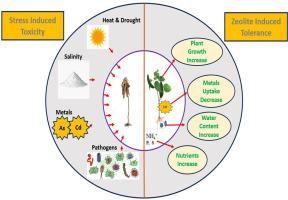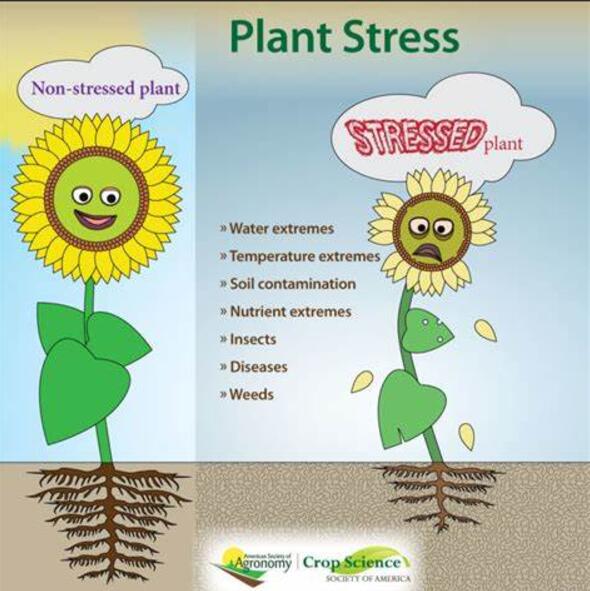天然沸石和合成沸石作为土壤改良剂在减轻非生物压力的负面影响以提高农业抗灾能力方面的作用
IF 6.8
Q1 PLANT SCIENCES
引用次数: 0
摘要
植物会受到不同类型的生物和非生物胁迫,从而降低生长和产量。本综述介绍了盐度、缺水和植物毒性金属对农业部门造成的负面影响,并强调了天然和合成沸石在改善不利生长环境方面的保护作用。此外,根据广泛的文献综述,沸石(特别是天然沸石)具有非凡的吸附能力、高功能性养分和水分保持及释放特性。沸石具有更强的选择性养分保持能力,可降低土壤中的养分流失,从而最大限度地减少因过量养分沥滤而造成的水污染问题。沸石对土壤中 Na+、Cl- 和各种植物毒性金属的吸附潜力改善了植物的生长环境。具体来说,在土壤中添加沸石有助于改善水分供应和植物生长参数:叶绿素含量、总蛋白质浓度和抗氧化防御活性;最终减轻极端温度、干旱或盐度等环境压力的不利影响。与合成沸石相比,天然沸石(尤其是沸石)在缓解植物压力(如盐渍化)方面表现更佳;可处理高达 100 毫摩尔的氯化钠盐负荷。有趣的是,沸石可与堆肥、生物炭或钙基材料等其他物质结合使用,以降低盐度。沸石中更多的亲水活性位点增强了其吸水性,限制了病原体生长所需的液膜的形成;提供有效的类似干燥剂的效果,保护植物免受多种病原体的侵害。总之,沸石应用可用作缓冲剂,以改善植物生长,并在不同的不利生长条件下提供更好的生物复原力。本文章由计算机程序翻译,如有差异,请以英文原文为准。

The role of natural and synthetic zeolites as soil amendments for mitigating the negative impacts of abiotic stresses to improve agricultural resilience
Plants are exposed to different types of biotic and abiotic stresses that reduce growth and yield. The review presents the negative effects posed by salinity, water scarcity and phytotoxic metals to the agriculture sector and underscores the protective role of natural and synthetic zeolites to improve the unfavourable growth environment. Furthermore, based on extensive literature review, zeolites (specifically natural zeolites) possess extraordinary adsorption capacity, highly functional nutrient and water holding and releasing characteristics. The enhanced and selective nutrient retention capacity of zeolites enables lower nutrient loss from soil, thereby minimizing the issue of water pollution through the leaching of excessive nutrients. The adsorption potential of zeolites against Na+, Cl- and various phytotoxic metals in soils improve the growth environment for the plants. Sepcifically, the addition of zeolites to soil facilitates improvements in water availability and better plant growth parameters: chlorophyll content, total protein concentration, and increased activity of antioxidant defense; eventually mitigating the unfavourable effects of environmental stresses such as extreme temperatures, drought or salinity. Natural zeolites, particularly clinoptilolite, were shown to be better in alleviating plant stresses such as salinity in comparison to synthetic zeolites; handling salt load of up to 100 mM of NaCl. Interestingly, zeolites can be used in combination with other substances such as compost, biochar or calcium-based materials to reduce salinity. The greater availability of hydrophilic active sites in zeolites enhances their water sorption strength, restricting the formation of liquid film required for growth of pathogens; delivering effective desiccant-like effects to protect the plants from several pathogens. In general, zeolite applications can be used as buffering agents to improve plant growth and to deliver better biological resilience during different unfavourable growth conditions.
求助全文
通过发布文献求助,成功后即可免费获取论文全文。
去求助
来源期刊

Plant Stress
PLANT SCIENCES-
CiteScore
5.20
自引率
8.00%
发文量
76
审稿时长
63 days
期刊介绍:
The journal Plant Stress deals with plant (or other photoautotrophs, such as algae, cyanobacteria and lichens) responses to abiotic and biotic stress factors that can result in limited growth and productivity. Such responses can be analyzed and described at a physiological, biochemical and molecular level. Experimental approaches/technologies aiming to improve growth and productivity with a potential for downstream validation under stress conditions will also be considered. Both fundamental and applied research manuscripts are welcome, provided that clear mechanistic hypotheses are made and descriptive approaches are avoided. In addition, high-quality review articles will also be considered, provided they follow a critical approach and stimulate thought for future research avenues.
Plant Stress welcomes high-quality manuscripts related (but not limited) to interactions between plants and:
Lack of water (drought) and excess (flooding),
Salinity stress,
Elevated temperature and/or low temperature (chilling and freezing),
Hypoxia and/or anoxia,
Mineral nutrient excess and/or deficiency,
Heavy metals and/or metalloids,
Plant priming (chemical, biological, physiological, nanomaterial, biostimulant) approaches for improved stress protection,
Viral, phytoplasma, bacterial and fungal plant-pathogen interactions.
The journal welcomes basic and applied research articles, as well as review articles and short communications. All submitted manuscripts will be subject to a thorough peer-reviewing process.
 求助内容:
求助内容: 应助结果提醒方式:
应助结果提醒方式:


